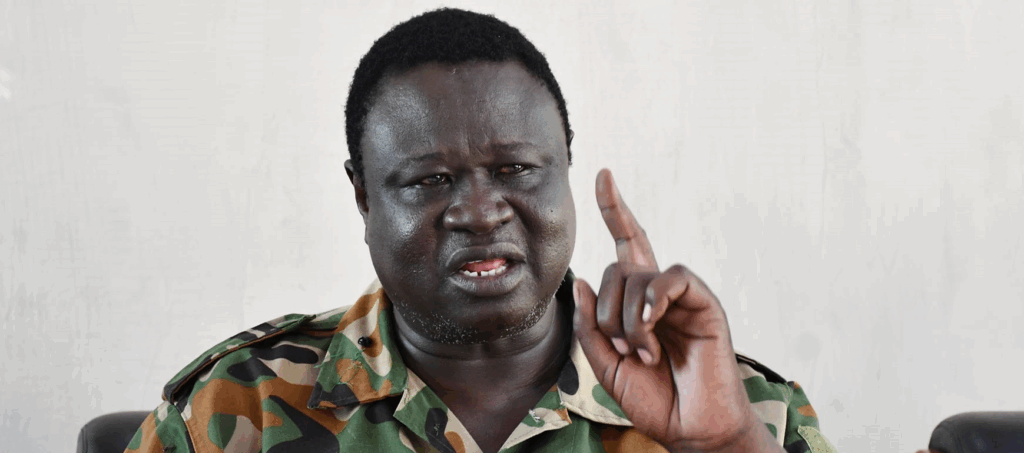South Sudanese President Salva Kiir has dismissed the chief of defense forces just three months after his appointment, as part of a wider reshuffle that has raised fresh concerns about political stability in the country.
The removal of Gen. Dau Aturjong Nyuol was announced late Wednesday on the state-run South Sudan Broadcasting Corporation (SSBC), without any official explanation. He was replaced by Gen. Paul Nang Majok, who had previously served in the same position for seven months until his removal in July.
Gen. Aturjong had been sworn in on July 10 and was tasked with critical reforms, including eliminating “ghost names” from military payrolls and improving conditions for soldiers. President Kiir had also instructed him to unify the army, ensure timely delivery of food and fuel supplies, and foster stronger military cooperation with regional allies.
The sudden dismissal has left analysts and observers questioning the rationale behind the president’s decision, particularly given the short duration of his tenure.
Gen. Paul Nang Majok, who hails from Warrap State, had faced criticism earlier this year for allegedly overseeing conflict in Upper Nile State. His return to the army’s top post has drawn skepticism.
Cabinet Reshuffle
In a series of additional decrees issued on Wednesday, Kiir also removed several key ministers, including Dr. Lam Akol Ajawin, a veteran politician and founding member of a faction of the South Sudan Opposition Alliance (SSOA).
Akol had served as Minister of Transport for only five months and had played a significant role in efforts to reform the transport sector, including initiatives to secure South Sudan’s airspace control.
His replacement, Rizik Zakaria Hassan, previously held the portfolio for Wildlife Conservation and Tourism. That position has now been filled by Denay Jock Chagor, a former governor of Jonglei State and a member of the South Sudan Opposition Alliance.
In a separate move, Kiir revoked the appointment of Beny Gideon Mabor as Minister of East African Community Affairs just two days after his nomination and before he had even taken the oath of office. He has been replaced by Gen. Pieng Deng Kuol, a former Inspector General of Police and a cousin of Deng Alor Kuol, who was dismissed from the same ministry on Monday.
Notably, Kiir reappointed Gen. Dau Aturjong—the just-dismissed army chief—as a technical advisor at the Ministry of Defense and Veterans Affairs.
Motives Behind Changes
Political analysts have expressed concern over the increasing unpredictability of government appointments. James Boboya, a Juba-based analyst, said the reshuffle reflects a preference for personal loyalty over political affiliation.
“These days, appointments are not about party lines,” Boboya told Radio Tamazuj. “It’s about who can remain loyal to the government.”
He warned that the cycle of rapid appointments and dismissals erodes public confidence and undermines institutional integrity. “Ministers are being dismissed within days, sometimes even before taking office. If the government wants to avoid public embarrassment, it should vet candidates properly before announcing them,” he said.
On the reappointment of Gen. Nang as army chief, Boboya added: “It’s strange how someone can be deemed unsuitable today, and then suitable again within months. Maybe our universities should research how the President defines what is good or bad in his officials.”
Concern Over Governance
South Sudanese human rights activists have also voiced concerns about the implications of the frequent reshuffles on governance and national stability.
“Appointing officials for only five or six months does not allow enough time for meaningful service delivery,” said Ter Manyang, a Juba-based civil society activist. “This undermines both individual performance and the overall functionality of government institutions.”
Manyang also criticized the reappointment of Gen. Nang, calling it a “direct declaration of war” due to his alleged history of favoring conflict over peace. “This move threatens to reverse progress towards peace and stability in South Sudan,” he said.
He urged the president and other political leaders to provide officials with at least one to two years in office to allow for proper performance evaluations. “Stability in leadership is key to reform, peace, and the effective delivery of public services,” Manyang added.




